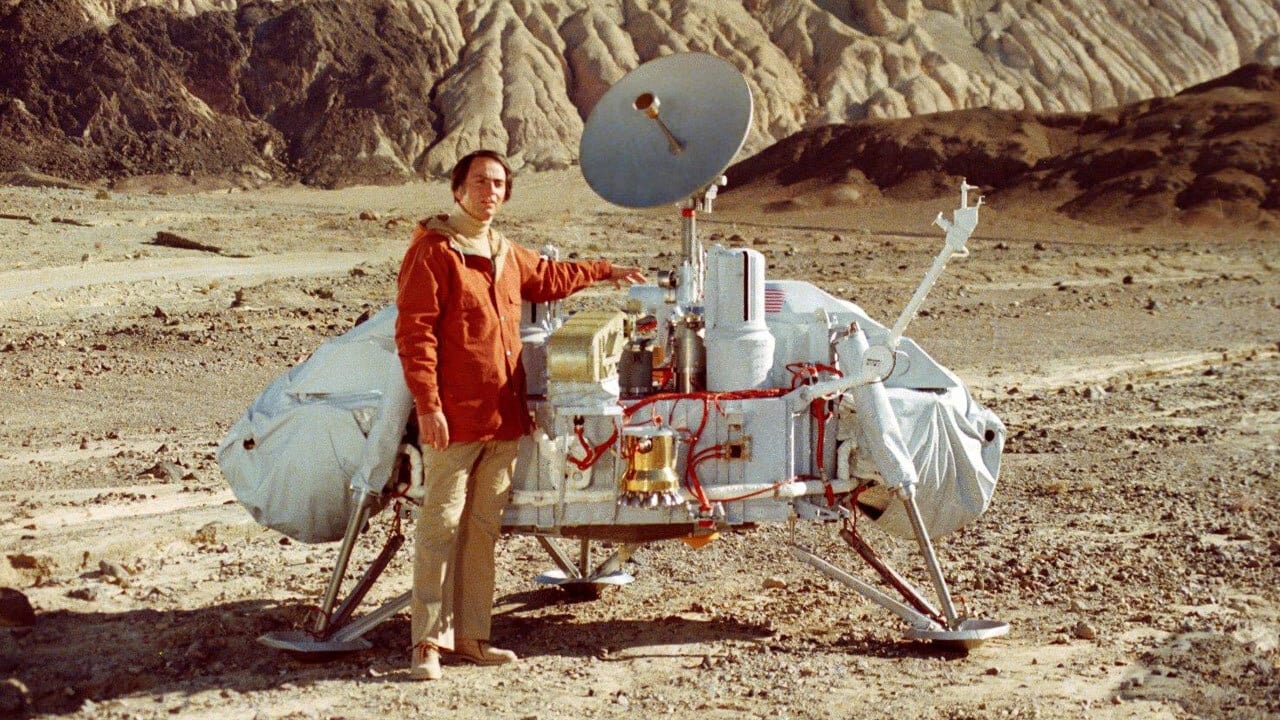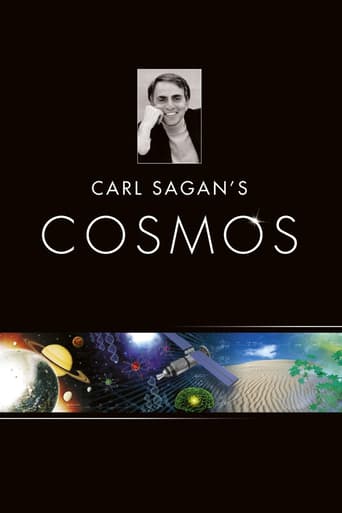

People are voting emotionally.
... View MoreAlthough it has its amusing moments, in eneral the plot does not convince.
... View MoreIt’s an especially fun movie from a director and cast who are clearly having a good time allowing themselves to let loose.
... View MoreThe movie really just wants to entertain people.
... View MoreOne of the greatest television documentaries of all time. Sagan takes the human quest for knowledge of our role in the cosmos and our long search for understanding of it and presents it in a way that appeals to scientists, philosophers, and dreamers alike. Given its age and the speed of discovery in astrophysics, it's no surprise that a little of the science has been superseded by later investigation, but that is largely irrelevant. The important thing with Cosmos is only partly the science, and is partly the air of wonder and joyful excitement which pours out of Sagan with every episode. His enthusiasm is infection. You find yourself wishing he was still alive, not just for the documentaries he would no doubt have made, but also because you realise how much he would have loved to have shared the new discoveries in astronomy in the last few years. If you ever needed a documentary to introduce someone to the wonders of science and to the amazing nature of our place in the universe, you could do no better than to show them Cosmos.
... View MoreI consider myself lucky to have seen this series and I will continue to watch over the years again and again. Where could I possibly start? The amazing music by Vangelis, Carl Sagan, personally my most beloved documentary host, or the subjects, the only show that doesn't only tell you about the discoveries but also describes from the scientist's point of view of how they were made? Have you seen any other documentaries out there showing Kepler as a child? Or another host visiting the Aegean? I don't think so... There is only one bad thing about Cosmos and that is that after watching it, you won't be able to watch another documentary without thinking that "Cosmos was better". 10 out of 10 from me, for Carl...
... View Morebasically everything has been said here, this is sort of an epic series. No matter if you like the topic or don't, its one of those thing that boarders perfection. Through this "epic journey" Sagan educates us on the true meaning of life, and the importance that each individual has to the contribution to the universe. Probably the most astounding thing about this film is the fact that it was made in the late 70s, and its facts still hold true today. Carl was a visionary that we will all miss, bit this mini series will be one of those documentaries that will stand the test of time. Its sort of the only documentary i have ever seen that truly does not have a bias, its just there for the betterment of mankind. In the end "we are all star stuff."
... View More(Note: This review is based on the 2000 DVD release version of the series)This year (2010) is the thirtieth anniversary of the original PBS airing of Cosmos. A thirteen part documentary series, it won both an Emmy and a Peabody Award at the time of its original broadcast and has subsequently become the most watched PBS program in the world (and held the U.S record for a decade until Ken Burns' The Civil War aired). Not bad for what on the surface would seem to be a long documentary on space. Cosmos though is far more then just that though. Cosmos is an epic journey with few boundaries and many lessons. Thanks to its host Carl Sagan and its three writers (Sagan, Ann Druyan and Steven Soter) Cosmos covers a wide range of topics. These range from the origins of life, its evolution from single cell to modern humans, the ongoing battles between science and superstition, our own evolving outlook on the universe, our fascination with the planet Mars (the subject of the fifth episode "Blues for a Red Planet"), the complexity of the human brain (episode 11 "The Persistence of Memory"), the possible existence of extraterritorial life and our species own survival in the future to name a few of the topics covered in the series. As a result, Cosmos touches on a huge variety of topics that covers much of the human condition and the universe around us at the same time. While some of the science is inevitably out of date after three decades, this is made up for by the afterwords at the end of most episodes and the series has actually predicted a number of things as well (such as the early version of the rovers now exploring Mars seen in the fifth episode). Despite some of the science being out of date, Cosmos is still remarkable for the sheer number of topics in covers on its journey.It makes that journey thanks to fine production values. The series takes Sagan around the world to countries such as India, Egypt, Italy, Japan, France and Mexico along with places across the United States as well such as Sagan's old elementary school where he speaks to children and the Very Large Array of radio telescopes in New Mexico). These foreign locations can also be seen in numerous historical segments that explore the history of astronomy or various events and people throughout history as well such as Johannes Kepler or Jean-François Champollion who became the first person in modern times to translate Egyptian hieroglyphs. To take us beyond the Earth and out into the universe, the series gives us a "Spaceship of the Imagination" based on a a dandelion seed that becomes a reoccurring motif throughout the series. While its interior is exactly what you'd expect out of a 1970s science fiction spaceship, the places it takes the viewer to are not. The effects of the series (at least those not augmented and/or replaced by CGI versions) stand up rather well today such as Sagan walking through a recreation of the library of Alexandria, the beautiful "galaxy rise" seen at the end of episode nine "The Lives Of Stars" or the simple effects used to create the supernova seen in that same episode. Last but not least, perhaps, is the use of music throughout the series from a wide range of sources both classical and more modern including the opening music or the use of Holst's "Mars The Bringer Of War" to help create perhaps the definitive screen version of the famous opening paragraph from H.G. Wells The War Of The Worlds to name but two examples. The result is that Cosmos continues to stand up well even against more modern documentaries and is made even more effective as a result.The series greatest strength may well be in its host, Carl Sagan. Cosmos opening sequence subtitles it "A Personal Voyage" and Sagan, one of the most famous scientists of the late twentieth century, makes Cosmos just that. Sagan's sense of wonder and excitement is evident throughout and it is those attributes that makes the potentially dull parts of this series (dull as in topic you might not personally be interested in) worth seeing. That is in large part because of Sagan's ability to bring abstract concepts (such as the mathematical parts of Episode 10 "The Edge of Forever" or the Drake equation in Episode 12 "Encyclopaedia Galactica") down to a level that almost anyone should be able to understand and find exciting. A great example of that lies in the statement by Sagan at the beginning of episode nine: "If you wish to make an apple pie from scratch, you must first invent the universe." which allows Sagan to take us on a journey from the impossibly small (atoms) to the impossibly large (stars, black holes etc). The series also illustrates Sagan's fears about our species seemingly ingenious ability to find new and more deadly ways of destroying ourselves, especially in the form of nuclear weapons. These fears are best expressed in the final episode of the series "Who Speaks for Earth?" and its haunting dream sequence. Sagan though makes sure that this journey is one that shows us that if we can survive our species destructive tendencies, our greatest accomplishments are still ahead of us. As a result, Cosmos is both an epic journey and a personal one as well thanks to Sagan. It is an epic journey not just across time and space but from the incredibly small to the incredibly large and from our species darkest moments to our greatest accomplishments. It is a personal journey thanks to Sagan, his sense of wonder and excitement about us and our universe. Perhaps its message is summed up best by Sagan himself:"The sky calls to us. If we do not destroy ourselves, we will one day venture to stars."May we indeed.
... View More